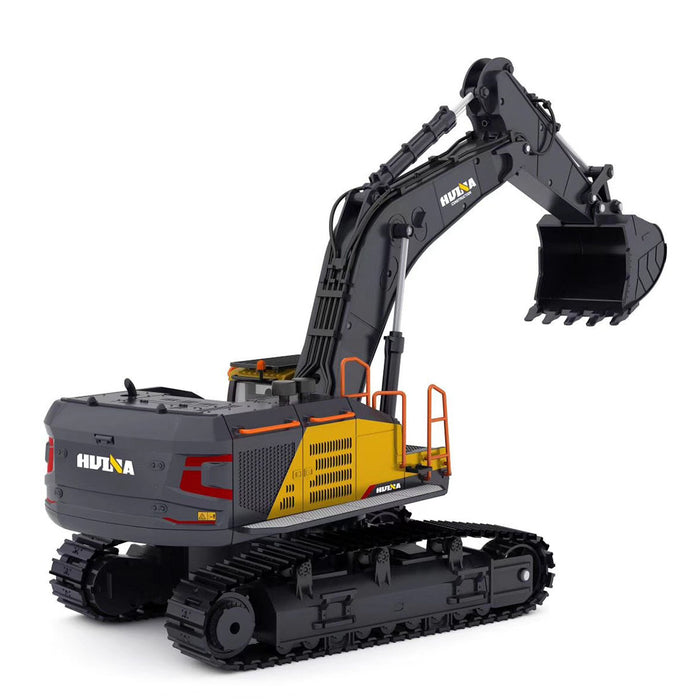Understanding Just How Excavator Functions and Its Influence On Effectiveness
Excavators play a crucial role in construction and mining procedures, counting on a complex interaction of hydraulic and mechanical systems. Their capacity to carry out a range of jobs depends upon both their layout and the technology incorporated within. Comprehending these components can greatly impact operational effectiveness and performance. As innovations continue to improve the industry, one need to consider just how these changes will affect future techniques and efficiency.
The Essentials of Excavator Mechanics

The Role of Hydraulic Solutions in Excavators
At the heart of excavator procedure lies the hydraulic system, which plays an essential duty in powering the maker's features and motions. This system uses pressurized hydraulic liquid to transfer energy, allowing various activities such as lifting, excavating, and swinging. By using the concepts of hydraulics, excavators can perform tasks with impressive accuracy and force, enhancing general operational efficiency.The hydraulic system contains vital elements, including pumps, cylinders, and valves, which interact to manage the flow and instructions of the fluid. When the driver involves the controls, the hydraulic liquid is guided to specific cyndrical tubes, translating the operator's commands right into physical movement. This system enables smooth and responsive actions, which are vital in construction and excavation settings. double e volvo rc excavator. The efficiency of the hydraulic system directly affects the performance and adaptability of the excavator, making it a crucial element in contemporary excavation processes
Key Components of an Excavator
Comprehending the vital components of an excavator is crucial for grasping exactly how this effective maker runs. An excavator consists of numerous substantial components, including the undercarriage, house, boom, bucket, and arm. The undercarriage supplies security and mobility, usually featuring tracks or wheels to navigate numerous terrains. Your house consists of the engine and hydraulic systems, allowing the operator to control movement and power the maker. The boom prolongs from your home, allowing vertical reach, while the arm attaches to the bucket, promoting excavating and lifting operations.Additionally, the taxi houses the operator, outfitted with controls for precise maneuvering. Each of these components plays an essential role in the excavator's overall performance, adding to its performance and effectiveness on building websites. Recognizing these parts assists in maintaining and enhancing excavator performance, making sure jobs are finished securely and effectively.
Add-on Adaptability and Its Advantages
Accessory convenience is an essential aspect of excavators, enabling operators to switch in between numerous devices customized for certain jobs. This flexibility not just boosts task effectiveness yet additionally adds to cost-effectiveness by lowering the need for multiple devices. Recognizing the various kinds of add-ons available can significantly influence the total efficiency and capability of an excavator on job sites.
Sorts of Attachments
While excavators are mostly identified for their digging capabilities, their true flexibility lies in the large variety of add-ons readily available. These accessories improve the excavator's performance, enabling it to do different jobs past excavation. Usual add-ons consist of pails (for excavating and scooping), hydraulic thumbs (for comprehending materials), and augers (for piercing openings) Grapples are utilized for moving and taking care of particles, while rippers can damage up difficult surfaces. Other specialized attachments, such as plates and rakes, make it possible for excavators to adjust to particular task requirements. This variety not only increases the machine's energy across various industries, including construction, demolition, and landscape design, but additionally allows drivers to tailor their devices to satisfy particular project needs efficiently.
Boosted Task Performance
Maximizing task performance is a key benefit of making use of numerous excavator accessories. Different add-ons enable an excavator to execute several tasks without needing to change devices, conserving important time and labor. As an example, using a hydraulic hammer can break concrete while a container accessory can dig deep into soil, enabling a seamless process. This convenience decreases downtime connected with tools adjustments and boosts productivity on-site. In addition, specialized add-ons improve accuracy in jobs such as grading or landscape design, leading to better results. The ability to adapt to various task requirements not just enhances procedures yet also decreases the requirement for added machinery, guaranteeing that projects are finished quickly and successfully. Generally, accessory versatility significantly contributes to boosted job efficiency in excavation job.
Cost-Effectiveness and Versatility
Cost-effectiveness is a considerable benefit of utilizing flexible excavator attachments. These accessories allow a solitary excavator to do numerous jobs, lowering the need for additional machinery and labor - double e volvo rc excavator. By switching over in between buckets, hammers, and grapples, drivers can take on different projects, from digging to demolition, therefore taking full advantage of devices utilization. This adaptability not only lowers operational costs however likewise lessens downtime connected with altering tools. In addition, the ability to tailor excavators with specialized add-ons enhances performance, as they can efficiently manage diverse jobs according to job needs. To end, the mix of cost-effectiveness and flexibility in excavator add-ons adds to improved functional performance and source allotment in construction and excavation jobs

Advanced Innovation in Modern Excavators
Modern excavators are significantly outfitted with sophisticated innovation that transforms excavation processes. Automation improves procedures, while improved fuel efficiency minimizes operational prices. Furthermore, clever control systems boost precision and safety, noting a considerable development in excavation tools.
Automation in Excavation Processes
As excavation innovation develops, automation has emerged as a vital part great post to read in boosting effectiveness and precision on work websites. Modern excavators are outfitted with advanced automated systems that assist in tasks such as grading, excavating, and trenching with very little driver intervention. These systems utilize sensors, GPS, and device learning formulas to assure exact positioning and depth control, considerably decreasing the margin for mistake. Furthermore, automation enables operators to concentrate on tactical decision-making instead of hands-on controls, leading to improved productivity on the whole. Such advancements not just enhance process but likewise improve safety and security by minimizing human error in complex procedures. Consequently, the combination of automation in excavation procedures stands for a significant innovation in building technology, driving the sector towards higher performance and efficiency.
Boosted Gas Efficiency
Innovations in modern technology have additionally caused significant renovations in gas efficiency for contemporary excavators. Modern makers are outfitted with advanced engines that enhance power outcome while decreasing gas usage. These engines utilize cutting-edge burning innovations, such as turbocharging and direct gas injection, to improve performance and performance. Furthermore, light-weight products in building minimize total weight, enabling much less energy expense throughout operation. The introduction of more info here variable speed controls enables operators to adjust engine efficiency according to details jobs, further reducing fuel use. Because of this, these enhancements not just reduced functional prices yet additionally add to environmental sustainability by minimizing exhausts. Generally, boosted fuel effectiveness in excavators is a vital development that reinforces performance and economic practicality in the building sector.
Smart Control Systems
While operators browse progressively complex work sites, clever control systems in excavators have actually become vital tools for boosting effectiveness and precision. These advanced modern technologies utilize algorithms and sensing units to keep track of various criteria such as load weight, surface conditions, and functional efficiency. By immediately readjusting hydraulic functions, clever systems optimize equipment performance, bring about boosted productivity and lowered wear on parts. Furthermore, drivers take advantage of intuitive interfaces that supply real-time comments and diagnostics, enabling informed decision-making. This combination of modern technology not just streamlines procedures yet additionally minimizes human error, contributing to more secure work environments. As the building industry remains to advance, wise control systems will certainly play a crucial duty fit the future of excavator performance and effectiveness.
Enhancing Operational Performance With Excavators
Excavators play a vital duty in enhancing operational efficiency across various construction and excavation projects. Their flexibility enables several tasks, including material, lifting, and excavating handling, which improves workflows and reduces the need for additional devices. With powerful hydraulic systems, excavators can carry out heavy-duty tasks with precision, substantially lowering the moment needed to total projects. The integration of sophisticated innovation, such as general practitioner and automated controls, further maximizes their procedure, enabling operators to attain better accuracy and minimize material waste. Additionally, modern-day excavators are developed to eat less gas and lessen emissions, adding to both cost financial savings and ecological sustainability. By using excavators effectively, construction groups can enhance performance, satisfy job due dates, and improve total website management. This multifunctionality and effectiveness make excavators essential tools in the modern construction landscape.
The Future of Excavators in Construction and Mining Industries
As the construction and mining industries evolve, the future of excavators is positioned for considerable makeover driven by technical development and changing functional demands. Breakthroughs in automation and artificial knowledge are reshaping excavator capacities, enabling improved accuracy and performance in operations. Self-governing excavators are emerging, reducing the demand for human intervention and decreasing the danger of accidents.Moreover, the integration of telematics and IoT innovation makes it possible for real-time surveillance of machine performance and predictive upkeep, optimizing uptime. Environment-friendly layouts, including electrical and hybrid designs, are acquiring grip, straightening with sustainability objectives within the industry.Additionally, the use of sophisticated materials and lighter layouts enhances gas efficiency while keeping efficiency requirements. As these trends development, excavators will certainly play a vital role in satisfying the increasing demands for productivity and safety in building and mining, eventually changing operational landscapes.
Often Asked Questions
Just How Do Climate Condition Affect Excavator Efficiency?

Weather considerably influence excavator performance, as rainfall and mud can hinder traction and stability, while extreme temperature levels might affect hydraulic systems. Operators has to adjust to these variables to guarantee ideal capability and security throughout operations.
What Safety And Security Procedures Should Operators Comply With While Making Use Of Excavators?
Precaution for excavator drivers include wearing proper personal safety equipment, performing pre-operation evaluations, making certain appropriate interaction with ground workers, keeping a secure distance from overhanging risks, and sticking to recognized functional protocols to stop accidents.
Exactly How Often Should Excavators Be Maintained for Optimum Performance?
Excavators ought to be kept frequently to ensure peak efficiency, typically every 250 operating hours or as specified by the maker. Regular checks enhance dependability, protect against unexpected malfunctions, and prolong the lifespan of the devices.
What Is the Ordinary Life Expectancy of an Excavator?
The ordinary lifespan of an excavator normally varies from 10,000 to 15,000 hours of operation. Elements influencing durability consist of maintenance practices, operating problems, and the quality of the maker itself, affecting general productivity and performance.

Can Excavators Run on Unequal Terrain Efficiently?
Excavators can run properly on uneven terrain due to their expressed layouts and flexible tracks. These features allow them to keep security and traction, enabling efficient procedure in difficult atmospheres frequently come across in building and construction and landscaping tasks. Each of these components plays a crucial function in the excavator's total capability, adding to its effectiveness and effectiveness on construction sites. Making the most of work effectiveness is a primary benefit of utilizing various excavator add-ons. While drivers browse progressively complicated visit this web-site job websites, smart control systems in excavators have emerged as vital devices for boosting performance and accuracy. Excavators play a vital role in boosting functional effectiveness across different construction and excavation projects. Advances in automation and man-made knowledge are reshaping excavator abilities, permitting for enhanced accuracy and efficiency in procedures.
Comments on “Understanding the Role of a rc excavator in Large-Scale Construction Projects”